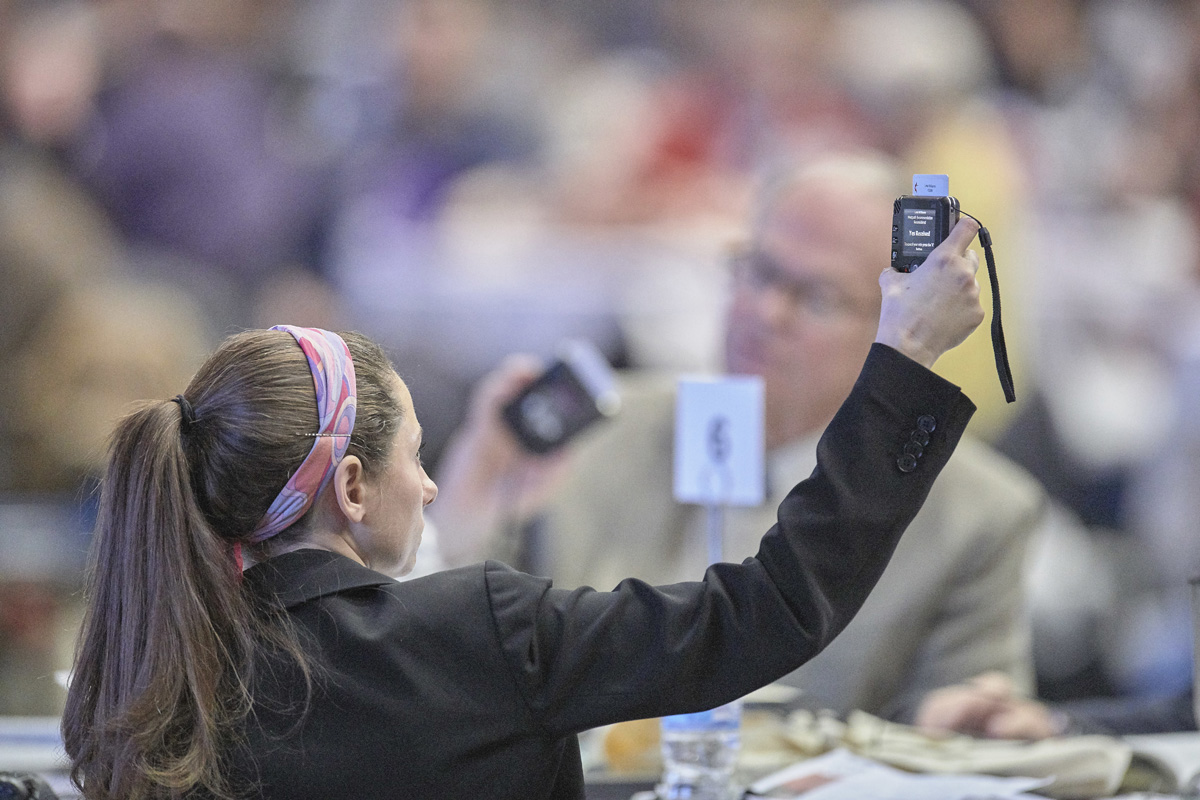General Conference organizers have established a think tank to explore different ways for processing legislation at this year’s gathering of The United Methodist Church’s top lawmaking body.
The assembly, scheduled May 5-15 in Minneapolis, could make decisions about how to split and restructure the international denomination of nearly 13 million members.
“This is not a General Conference as usual,” said Kim Simpson, chair of the Commission on the General Conference and a lay member in the Central Texas Conference.
Some delegates are pushing to consider separation proposals early in the assembly, before any other legislation.
Simpson called the Feb. 19 teleconference for the international group of clergy and laity who plan the big meeting.
“I think it’s important that we be proactive and look at ways to help General Conference look at legislation in the best way possible,” Simpson said.
The think tank will include the commission’s executive committee, General Conference staff and three additional bishops.
Simpson said the group will look at how delegates can do their best work, how to best gauge what the body wants and possible “what if” scenarios that could affect the proceedings.
Anything the think tank suggests will need the approval of the full commission, which includes traditionalists, centrists and progressives, before heading to General Conference.
Simpson stressed that she sees the think tank’s work as not authoritative but as a possible aid to the General Conference’s Agenda and Calendar Committee. Its recommendations would also have to be within General Conference rules.
The agenda committee, a bishop-appointed panel, meets during General Conference and drafts the agenda that goes before delegates each day.
The commission plans to ask for a budget of up to $90,000 for the think tank’s meetings, including one face-to-face session. Sara Hotchkiss, General Conference business manager, said the funding would come from contingency funds administered by the Connectional Table, which acts as a sort of church council for the denomination.
Simpson said the commission already is hearing from delegates who want certain legislative petitions to take priority. She read a letter from the Virginia Conference delegation, which wants the proposed Protocol of Reconciliation & Grace Through Separation as well as the Christmas Covenant to top the agenda.
Who is on the think tank?
The commission’s executive committee includes Kim Simpson, Stephanie Henry, Marie Kuch-Stanovsky, the Revs. Mujinga Kashala, Gary George, Juliet Spencer and Lynn Hill, as well as Bishop Thomas Bickerton of the New York Conference.
Also named to the think tank are three additional bishops: Commission member Bishops Rodolfo “Rudy” Juan of the Davao Area in the Philippines, Kenneth Carter, Council of Bishops president, and Marcus Matthews, Council of Bishops executive secretary.
General Conference staff who will serve on the think tank are: the Rev. Gary Graves, General Conference secretary; Sara Hotchkiss, business manager; Susan Brumbaugh, coordinator of the calendar; the Rev. Abby Parker Herrera, petitions secretary; and Raymond Trapp, worship director.
The protocol is a mediated agreement by a diverse group of bishops and advocacy group leaders that seeks to separate the denomination without lawsuits. The Christmas Covenant calls for restructuring the denomination into regional conferences, including a U.S. regional conference.
One possibility under consideration is finding a way for all 862 delegates to consider certain pieces of legislation, like the protocol, as a single legislative committee. That was what happened with the legislative proposals at the 2019 special General Conference.
But that may not be possible, given the limitations of General Conference rules and the Book of Discipline’s requirement that all validly submitted legislation receive a vote in a legislative committee.
The General Conference Commission has the authority to decide the number of committees. It named only one such committee for the four-day 2019 special session in St. Louis that focused on the denomination’s debate over LGBTQ status.
However, the commission has already named 14 legislative committees to deal with the varied kinds of proposals before this regular 10-day General Conference.
Not everyone on the General Conference Commission thought the unusual step of the think tank was necessary.
“We need to follow the normal procedure of General Conference, so the plans coming before it should be treated like normal petitions,” the Rev. Mujinga Kashala, the commission’s vice chair, said through an interpreter. She is a district superintendent in Congo’s South-West Katanga Conference.
She abstained from the commission’s vote on the think tank. As an executive committee member, she will serve on the body.
“I really don’t see how this General Conference is different from any other General Conference,” she said.
Bishop Thomas Bickerton, the Council of Bishops representative on the commission, disagreed. He was part of the team that negotiated the protocol.
The tumultuous special General Conference approved, by a 438-384 vote, the Traditional Plan that strengthens the denomination’s bans on same-sex weddings and “self-avowed practicing” gay clergy. However, since the vote, the church rules have faced increasing resistance.
Subscribe to our
e-newsletter
“I think this special session in St. Louis changed the entire landscape of how we move forward as a body of Methodists,” said Bickerton, who also leads the New York Conference.
“In New York, I’ve been describing St. Louis like a pressure cooker where the lid blew off.”
Simpson emphasized that the commission does not try to influence what the 2020 General Conference decides but works to ease the way for delegates’ decision-making.
“We are the vehicle to get content to the General Conference’s body so they can make decisions,” she said.
Hahn is a multimedia news reporter for United Methodist News. Contact her at (615) 742-5470 or newsdesk@umcom.org. To read more United Methodist news, subscribe to the free Daily or Weekly Digests.
Like what you're reading? Support the ministry of UM News! Your support ensures the latest denominational news, dynamic stories and informative articles will continue to connect our global community. Make a tax-deductible donation at ResourceUMC.org/GiveUMCom.



